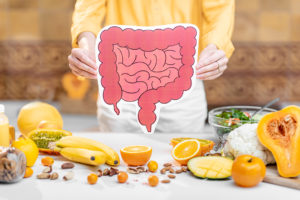 The foods we eat have a huge impact on our overall gut health. As we discussed in part 1, fermented foods can help to build and support a diverse population of good gut bacteria. Keeping a healthy balance of good bacteria is important to keep the bad ones in check. In part 2, we talked about the importance of a fiber-rich diet. Adequate fiber intake is essential for healthier bowel movements and providing prebiotic fuel for the good bacteria in our guts. For part 3, we’ll turn our focus toward foods that can aid our gut health in other ways, like improving digestion, reducing inflammation, and reducing the symptoms of conditions like irritable bowel syndrome (IBS).
The foods we eat have a huge impact on our overall gut health. As we discussed in part 1, fermented foods can help to build and support a diverse population of good gut bacteria. Keeping a healthy balance of good bacteria is important to keep the bad ones in check. In part 2, we talked about the importance of a fiber-rich diet. Adequate fiber intake is essential for healthier bowel movements and providing prebiotic fuel for the good bacteria in our guts. For part 3, we’ll turn our focus toward foods that can aid our gut health in other ways, like improving digestion, reducing inflammation, and reducing the symptoms of conditions like irritable bowel syndrome (IBS).
Vinegar and oil
Let’s kick things off with one of the most popular foods for supporting healthy habits, apple cider vinegar. The fervor for this super ingredient has become so strong in recent years that apple cider vinegar shots are common items at the grocery store checkout line. I’m not convinced that it’s quite the miracle ingredient that some have proclaimed, but it has been shown to offer some benefits for gut health. Apple cider vinegar can help the body to create hydrochloric acid (HCL). This can be beneficial for people with low stomach acid or those suffering from acid reflux. Apple cider vinegar has also been shown to increase feelings of fullness, which can lead to weight loss through a reduced likelihood of overeating.
If you want a bit of fat to pair with your vinegar, olive oil is a great choice for gut health. It has strong anti-inflammatory properties and high concentrations of antioxidants. Olive oil has been shown to ease indigestion and even contains nutrients that can inhibit or kill harmful bacteria, such as H. pylori.
Functional fruits
You know what they say… an apple a day keeps the doctor away. While not strictly true, apples are one of the better fruits in terms of supporting gut health. As mentioned in part 2, apples contain pectin, a prebiotic fiber that our good gut bacteria use as nutritional fuel. Pectin has also been shown to be beneficial for its ability to bypass digestion in the small intestine. Instead, it is broken down in the colon, where it can help to resolve bowel issues and even decrease inflammation. Pineapple is another great fruit for gut health, especially for those suffering from indigestion and acid reflux. It contains a compound called bromelain that can help us to better digest proteins. Papaya also contains a helpful compound for gut health, a digestive enzyme called papain that helps to break down protein fibers. Papain has been shown to ease symptoms like constipation and bloating in individuals suffering from IBS.
Stomach soothing and gut guarding
Peppermint has been a popular ingredient for soothing the gut for centuries. Peppermint oil is often taken as a digestive supplement on its own. This is because peppermint oil contains menthol, a compound that has been shown to reduce the frequency and severity of indigestion, reduce bloating, improve bowel movements, and ease some of the symptoms of IBS.
Bone broth is another food that has received much attention in recent years for its health benefits. It is a stock made by simmering bones and connective tissue slowly over a long period of time. This slow cooking process infuses the stock with flavor and slowly draws out the nutrients within the bones and tissue. Bone broth contains a high concentration of glutamine, an amino acid that has been shown to protect the intestinal wall and improve leaky gut syndrome. Bone broth also contains gelatin which can bind to water in your digestive tract and help move food through the gut more easily.
Keeping things fluid
While not technically food, it’s important to remember how critical fluids are for a healthy gut. Water can help digestion to move more quickly by breaking down food early on in the digestion process. It softens stool to help prevent constipation and is absorbed by fibers to add bulk and promote regular bowel movements. Water also helps to satiate hunger by increasing feelings of fullness, which can reduce overeating and calorie intake. This is especially true because it’s not always easy for people to tell if they are hungry or just thirsty.
Probonix is another liquid that can help with digestion! A daily probiotic is a great complement to a healthy gut. It provides your body with healthy bacteria to support healthy digestion and prebiotics to keep the healthy bacteria fed and effective. All of the healthy foods we’ve discussed today work in tandem with Probonix to support a healthy gut, so be sure to consider both when looking for ways to improve your gut health.
If you like this, you’d also like:



